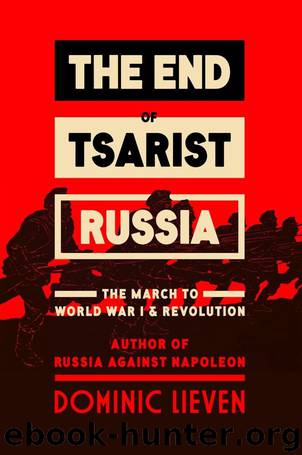The End of Tsarist Russia: The March to World War I and Revolution by Dominic Lieven

Author:Dominic Lieven [Lieven, Dominic]
Language: eng
Format: epub
Publisher: Penguin Publishing Group
Published: 2015-08-18T04:00:00+00:00
CHAPTER 5
CRISIS FOLLOWS CRISIS, 1909–13
Recovering from Humiliation
The Russian press coined the unhelpful phrase “diplomatic Tsushima” to describe Russia’s surrender to German and Austrian pressure at the climax of the Bosnian crisis. The phrase was a great exaggeration, but it reflected the mood of Russian public opinion and its acute sensitivity to further defeat and humiliation. This was the most important legacy of the Bosnian crisis. In the winter of 1912–13, war would erupt in the Balkans and threatened to drag in the great powers. Tensions mounted between Petersburg on the one side and Vienna and Berlin on the other. At the very outset of the crisis, the Russian foreign minister, Serge Sazonov, stressed to the German ambassador in Petersburg, Count Pourtalès, that Russia sought peace and was very open to compromise, but the one thing it would never again tolerate was being faced with ultimatums or having its back forced to the wall as in 1909. Both Pourtalès and the Austrian ambassador, Count Douglas Thurn, believed Sazonov and made this reality very clear to their governments. Thurn repeated on numerous occasions during the Balkan crisis that although the Russian leadership sought and badly needed peace, it would accept even a nearly hopeless war rather than face further humiliation: “The defeat of 1909 has left far too deep a legacy here for any Russian government, however peacefully disposed, to be able to survive any repetition of this event.” Nothing had changed by July 1914, when Russia faced the choice between war and surrender to an even more peremptory and humiliating Austro-German challenge. The ambassadors of the Central Powers in Petersburg did their job, but their masters in Berlin and Vienna chose to ignore them.1
One immediate and inevitable result of the Bosnian crisis was to reinforce the Russian government’s determination to restore its military power at all possible speed. The Council of Ministers had been discussing variants of military and naval arms programs already when the Bosnian crisis began. In 1910, the council agreed to spend an additional 1.413 billion rubles in the coming decade on the army and the navy, over and above their current ordinary annual budgets. It is sometimes argued that the arms race which contributed so much to international tensions before 1914 was set off by this massive boost to Russian armaments, which “undermined the military equilibrium not only in Eastern Europe but in Europe as a whole.” This is absolutely not how the Russian government saw matters at the time. The fundamental and underlying reality of the Bosnian crisis and its humiliating finale was that Russia was too weak to fight, and its rivals knew this. Subsequently, the Italian foreign minister described Russia as a “great powerless country,” and the Austrian ambassador in Rome commented at the end of 1909 that “Russia’s military impotence has become an axiom.” No responsible Russian government could tolerate this perception or the reality that underpinned it. Russian rearmament reflected a desperate search for security and status born of a deep sense of weakness and humiliation.
Download
This site does not store any files on its server. We only index and link to content provided by other sites. Please contact the content providers to delete copyright contents if any and email us, we'll remove relevant links or contents immediately.
| Africa | Americas |
| Arctic & Antarctica | Asia |
| Australia & Oceania | Europe |
| Middle East | Russia |
| United States | World |
| Ancient Civilizations | Military |
| Historical Study & Educational Resources |
Cecilia; Or, Memoirs of an Heiress — Volume 1 by Fanny Burney(32548)
Cecilia; Or, Memoirs of an Heiress — Volume 2 by Fanny Burney(31947)
Cecilia; Or, Memoirs of an Heiress — Volume 3 by Fanny Burney(31932)
The Secret History by Donna Tartt(19053)
Sapiens: A Brief History of Humankind by Yuval Noah Harari(14370)
Leonardo da Vinci by Walter Isaacson(13318)
The Radium Girls by Kate Moore(12018)
Sapiens by Yuval Noah Harari(5366)
How Democracies Die by Steven Levitsky & Daniel Ziblatt(5216)
The Wind in My Hair by Masih Alinejad(5092)
Homo Deus: A Brief History of Tomorrow by Yuval Noah Harari(4908)
Endurance: Shackleton's Incredible Voyage by Alfred Lansing(4769)
Man's Search for Meaning by Viktor Frankl(4585)
The Silk Roads by Peter Frankopan(4526)
Millionaire: The Philanderer, Gambler, and Duelist Who Invented Modern Finance by Janet Gleeson(4469)
The Rape of Nanking by Iris Chang(4203)
Joan of Arc by Mary Gordon(4101)
The Motorcycle Diaries by Ernesto Che Guevara(4089)
Stalin by Stephen Kotkin(3957)
